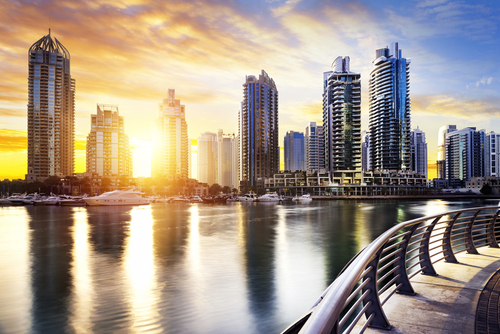With Middle East demand for construction booming, the British office of Adexsi UK is increasingly designing and supplying key elements for construction projects, and civil engineering projects, across the region.
While many are familiar with the landmark buildings in cities such as Dubai, other emirates are investing heavily in infrastructure to help with future sustainable growth.
Both Qatar and Kuwait are pushing ahead with plans to improve their infrastructure, with new rail links, ports and airports planned. Regions of the Middle East are planning for the future, looking to reduce their reliance on the oil and energy sectors. And, with substantial growth in their populations, the importance of improving the “livability” of the region’s key cities is paramount.
Kuwait expects to grow its infrastructure sector 15-20% this year, while in Qatar consultants BMI Research are predicting a 13% growth in construction for 2015.
Residents in Kuwait are looking forward to 2019, when the newly constructed metro system will start running. Extending over 160 kilometres, it will be accessed via 69 stations.
Doha is also getting a new metro network, to improve transport and reduce traffic congestion. Ultimately there will be four lines that will link 100 stations via around 300 kilometres of track.
The metro will be tunnelled under the central area of Doha, running at ground level or on elevated track in outer areas. Driverless trains have been ordered, with work being undertaken by a range of international specialist contractors.
However, the first railway system to be operational is expected to be the Lusail Light Rail Transit, which launches in 2018. This light rail system is being built as an integral part of the development of the new city of Lusail, to the north of Doha.
The Doha system is just part of a major infrastructure spend commitment from the government. Around $200 billion will be invested under a development plan that extends to 2030. The city’s port is also being extended, ensuring it can compete with local rivals, while other major infrastructure projects cover health and education.
While questions remain about the planned 2022 World Cup, five football stadiums are in the pipeline with work already begun on two of them, the Qatar Foundation stadium and Khalifa International stadium. Qatar’s Supreme Committee for Delivery and Legacy has said it will review further stadium requirements by the end of the year. Commentators suggest that the booming Qatar construction market will be affected little by any possible changes to the expected World Cup construction programme.
Inevitably, the construction boom in the region puts pressure on the sector, with costs rising, materials sometimes in short supply and a question over the necessary manpower. However, with large expatriate workforces and the ability to call in international staff to deliver projects, such challenges can inevitably be overcome.
Elsewhere in the region, hopes are high that the recently negotiated Iran nuclear deal will be ratified, enabling Iran and its capital Tehran to open up for business. The country has major infrastructure investments to be made, and international contracting businesses are looking forward to being able to work in Iran in the near future, generally teaming up with local partners.
Among projects where Adexsi UK has already seen its involvement are the Jeddah South Thermal Power Plant, and Muscat airport in Oman.
- About
- Our Solutions
adeprotect ®
Whole Life FM – Maintenance & Repair Solutions
adeshade ®
Brise Soleil, Solar Shading & Architectural Louvres
adesolar ®
Photovoltaic & Solar Power Systems
adesmoke ®
Smoke & Heat Exhaust Ventilation Systems (SHEV’s)
- Our brands
- Products
- Projects
- Services
- What’s Happening
- Resources
- Contact
